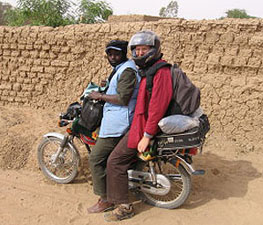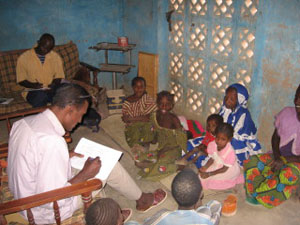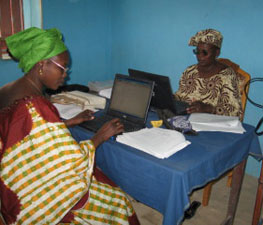











SAGA
B16 MVR Hall
Ithaca, NY 14853
(607) 255-8931
Fax (607) 255-0178
saga@cornell.edu
|
RESEARCH
The research component of SAGA involves collaborations with African Scholars to research four broad themes: |
- Schooling, education, and human capital
- Health and nutrition
- Risk, vulnerability and poverty dynamics
- Empowerment and institutions
Without access for all Africans to education and health services, growth will be low and inequitable. Without access to markets and institutions, the poor cannot protect themselves against the vagaries of nature and of the market place.
And, if the poor do not have access to local and national institutions that allow their voices to be heard, then policy making will not reflect their interests.
We address these issues of access with policy-relevant research, including
- an examination of the determinants of primary schooling and simulation of policy alternatives for raising enrollments in Madagascar with particular attention to the role of the private sector as well as investments in new public schools and teachers.
- a simulation of how gender gaps in secondary school completion within 23 sub-Saharan African countries could narrow if these countries reduced the incidence of pregnancy-related dropouts.
- a comparative analysis of the determinants of HIV/AIDS related knowledge and behavior in Burkina Faso, Kenya, Tanzania, Uganda, and Zimbabwe.
- an analysis of the intertemporal labor market behavior of women in urban Guinea, West Africa
- a study of Uganda’s progress on poverty reduction when poverty is measured in multiple dimensions.
- studies on the interrelationship between public safety nets in Kenya, such as
food aid and livestock destocking/restocking programs, and private assistance
schemes based on social insurance mechanisms, informal lending, and altruistic
transfers, particularly in arid and semi-arid areas especially prone to climate,
conflict and market shocks.
|
| FROM MALI: Andrew Dillon extended a panel data set originally collected in 1997 in
the Tombouctou region of Mali with the help of a SAGA research grant. The
research was carried out between December 2005 and April 2006 to
investigate the dynamics of child labor and human capital formation. |

Before data collection began, a group
of 20 enumerators were trained in good survey techniques and the sense of
each question. Questions written in French were translated into local
language so that enumerators would understand and know how to administer
the questionnaire in local languages. Photo from Andrew Dillon.
|

Andrew Dillon and Ousmane
Bocoum are heading out to a survey village, Tomba together to administer
the survey. The motorcycles were our primary means of transportation. Photo from Andrew Dillon.
|

Enumerators administered questionnaires
directly in the household with the family members concerned. The
questionnaire was composed of men’s, women’s and a children’s section. Photo from Andrew Dillon.
|

Children’s
anthropometry was an important part of the survey. Here the enumerators
are using measuring boards providing by UNICEF for measuring children’s
height. Photo from Andrew Dillon
|

The team of data verification and input is working in
this photo. All data was checked for consistency and then entered by the
two data entry specialists. Photo from Andrew Dillon
|
|
|
Our research methods are multidisciplinary, and we have a special interest in the combination of qualitative and quantitative studies of poverty. We also focus on the dynamics of poverty, with special attention to the microeconomic and institutional constraints that hold back Africa’s poor.
To maximize the policy relevance of our efforts, we develop SAGA’s research program collaboratively with our partner institutions, USAID missions, policy makers, and other stakeholders in each core country.
You can read the full research section of our SAGA proposal here:
Proposal (PDF format)
(When you click the SAGA Proposal link above,
Adobe Acrobat
Reader should open to
display the form. If you do not
have Acrobat Reader,
you can download it free from the Adobe
web site.)
Proposal (HTML format)
Read our research papers in the publications section of this site.
HOME | RESEARCH |
PUBLICATIONS |
TECHNICAL ASSISTANCE |
CONFERENCES |
GRANTS |
PARTNERS |
PROJECT PERSONNEL |
PROGRESS REPORTS |
LINKS |
CONTACT US | SEARCH
copy; 2017, 2016–2001 SAGA
|
|